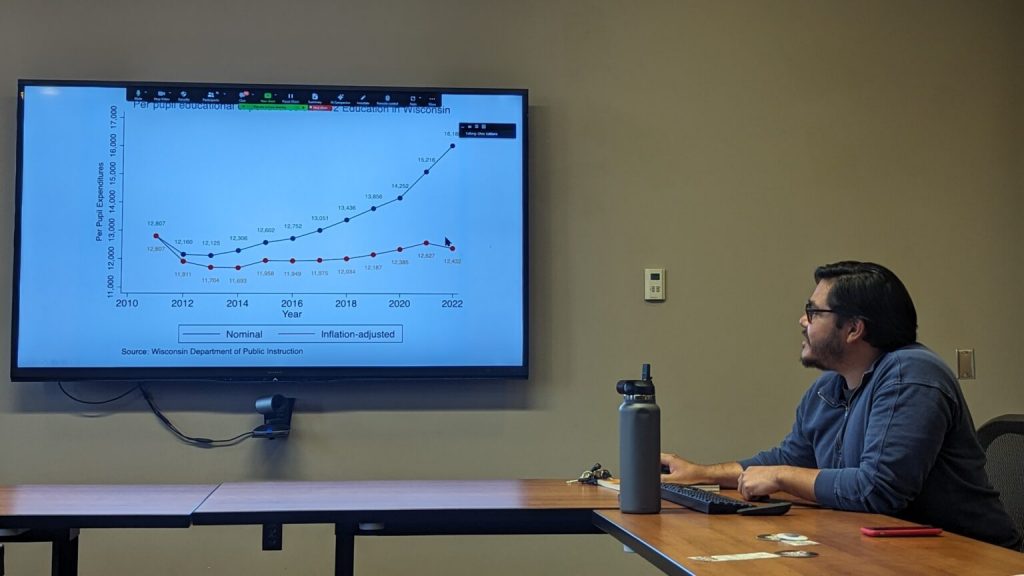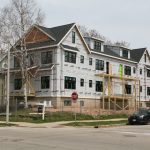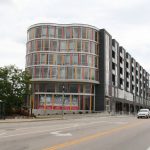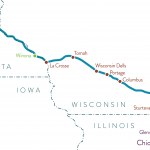School Districts Take Stock of Referendum Results
Across state, 56 of 93 of April ballot requests for more money passed.

In the most recent budget, lawmakers provided districts with a $325 per pupil increase in each year, but that increase did not begin to keep pace with inflation, leading many districts to go to voters this month. Chris Saldaña, UW-Madison assistant professor of K-12 educational leadership and policy analysis, presents a chart that shows how school funding in Wisconsin has not kept pace with inflation at a Wisconsin Public Education Network event. (Wisconsin Examiner photo)
The results were mixed last week for the school districts that went to voters for approval to raise local property taxes as a way of helping meet costs.
Fifty-six of 93 referendum requests passed — about a 60% passage rate — according to preliminary results. The results will have implications for how school districts afford a wide array of costs including paying staff, updating curriculum, offering programs and services to students and addressing building maintenance.
State Department of Public Instruction Superintendent Jill Underly, reacting to the referendum results, said in a statement that Wisconsin communities are being put in “an impossible position.”
Schools districts in Wisconsin are increasingly relying on money approved via referendum to support local education. The state’s school revenue caps, which were first implemented in 1993, have not kept pace with inflation since 2009. This has led schools across the state to regularly turn to voters to ask for additional funding.
In the most recent budget cycle, lawmakers provided districts with a $325 per pupil increase in each year, but that increase did not begin to keep pace with inflation, leading many districts to go to voters this month.
“While billions of dollars sit in the state’s coffers in the form of a surplus, voters are making the difficult decision whether to raise their own taxes just so their public schools can survive,” Underly said, adding that the results are “further proof that our state is not living up to its responsibility.”
Wisconsin Public Education Network Executive Director Heather DuBois Bourenane told the Wisconsin Examiner that there were “some huge wins and some gutting losses” among the recent round of school funding referenda. The results, she said, will ultimately “further and inequitably widen the gaps for kids around the state.”
“These mixed results reflect voters’ fatigue with funding by referendum, and frustration with having to foot the bill for a larger and larger share of school funding while politicians use misleading and confusing rhetoric suggesting that schools are adequately funded by the state, which is grotesquely untrue,” DuBois Bourenane said.
Voters in total approved about $955 million for schools across the state.
Milwaukee Public Schools, which had the largest request in the state, received approval in a 51% to 49% vote of its $252 million request, despite a campaign against the request led by the Metropolitan Milwaukee Association of Commerce (MMAC).
The district thanked supporters in a statement, saying MPS class sizes will stay smaller; art, music, physical education, and library programming will remain; and high-quality teachers and support staff will be retained as a result of the approval. MPS added that the funding will also allow further investment in language programs, career and technical education and mental health support.
The second largest request from the New Richmond School District in St. Croix County, which was seeking $113 million to cover the costs of additions, maintenance needs and renovations at Starr Elementary, Paperjack Elementary and New Richmond Middle School, passed 58% to 42%.
However, results weren’t affirmative for all school districts with voters rejecting 37 requests in total.
Voters rejected Mukwonago School District’s $102 million request — the third largest in the state — that would have been used for the construction of a new middle school and renovations at the district’s elementary school.
The School District of Beloit had asked voters to agree to raise property taxes to fund $27 million that will go towards paying staff and maintaining district facilities, course offerings, programming, class sizes and special education. It was rejected by about 60% of voters.
Beloit Superintendent Willie Garrison said in a letter sent to families after the results that the district will “have to make significant budget cuts to balance our budget for the 2024-2025 school year.”
Garrison told the Examiner ahead of the election that the referendum was going to be used just to maintain the current services the district provides, and that without it the district would be looking at cuts in every area.
Bristol School District #1, which is located in Kenosha County, received its second rejection in two years. It had asked voters to allow it to shift $700,000 in the 2024-25 and 2025-26 school years that is earmarked in the district budget for paying down debt and use it instead for operations.
The referendum would have been used to help update curriculum in the district, to maintain wages and benefits for school staff and for building maintenance.
Danielle Whitaker, a parent and school board member, said the results were disappointing, but added she was proud of the effort that went into advocating for the measure. She campaigned with the “Bristol Votes Yes” committee in her capacity as a parent, not a school board member.
The district’s request this year failed by 10 votes: 784 to 774. In comparison, the district’s first attempt for an operational referendum — a $2.4 million request that would have covered $800,000 a year for three school years — failed by 153 votes in April 2023.
“To come that close is disappointing,” Whitaker said, adding that referendum fatigue and the efforts of a “Bristol Votes No” likely played a part in the measure’s failure.
Whitaker noted that no one took public credit for the opposing committee, but said mailers sent ahead of Election Day and text messages from the campaign sent to voters the morning of the vote likely played a role in the referendum results.
“We really just didn’t anticipate such an aggressive ‘Bristol Votes No’ campaign — particularly a campaign that really twisted reality and created a narrative that was really designed to tarnish the reputation of the school,” Whitaker said.
District Administrator Jack Musha told the Examiner ahead of the election that inflation and relatively flat state funding were major reasons for the district needing to ask voters to reallocate the funds. He also said ahead of the election that the district has had to dip into its fund balance to keep up with expenses, and the fund has gotten low enough that district officials might have to consider short-term borrowing, which they wanted to avoid.
Texts sent to voters accused the district of being “fiscally irresponsible” and “coming to taxpayers for a handout.”
Whitaker said she is not sure what the future holds for districts in situations like Bristol’s. Now, she said, she is moving her attention to the state’s next biennial budget.
“The only hope for schools like Bristol at this point is to get the [special education] reimbursement where it should be or to get an increase from state funding that matches inflation,” Whitaker said.
State funding, she said, plays a role in why local school funding campaigns are becoming so contentious.
“Unfortunately, with the way that state funding is, it creates battles in local communities where we all know one another, and it’s painful,” Whitaker said. “I hope that that trend changes.”
School districts, communities, take stock of April referendum results was originally published by Wisconsin Examiner.
















